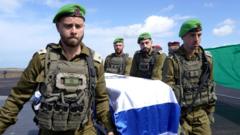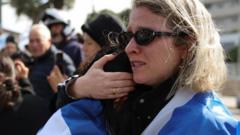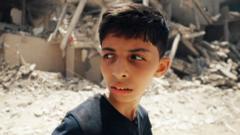**The return of the deceased hostages has sparked national mourning in Israel, highlighting the human cost of the ongoing conflict and the fragile nature of peace negotiations.**
**Tragic Return: Israel Mourns as Hamas Delivers Deceased Hostages**

**Tragic Return: Israel Mourns as Hamas Delivers Deceased Hostages**
**Israel faces profound grief as Hamas returns the bodies of four hostages, raising tensions and reflections on a tumultuous ceasefire.**
The bodies of four individuals, including a mother and her two young children, taken hostage during Hamas's attack on October 7, 2023, have been returned to Israel, leading to an outpouring of grief across the nation. President Isaac Herzog expressed the sorrow of an entire country, stating, "The hearts of an entire nation lie in tatters." The victims included Oded Lifschitz, an 84-year-old peace activist. Only one of the deceased has been confirmed, while the others remain unverified, a fact that has only deepened the public's anguish.
In a video statement, Prime Minister Benjamin Netanyahu emphasized the nation's collective despair, lamenting the return of the hostages in such tragic circumstances. A vigil at Hostages Square in Tel Aviv drew thousands, who honored the deceased with a minute of silence in solidarity and mourning.
In a stark contrast to the loss felt in Israel, the handover's visual spectacle in Gaza included an orchestrated display, revealing complex sentiments within both communities. Amid propaganda and charged symbolism, Hamas showcased the coffins to local spectators, a scene criticized by human rights organizations for its lack of dignity and protocol.
The transfer was condemned by United Nations Human Rights Chief Volker Türk, who called it "abhorrent and cruel," stressing the importance of respect during such sensitive proceedings. The International Committee of the Red Cross echoed these sentiments, advocating for a more private approach to the return of bodies.
The recent developments underscore the complexity of the situation following a period of ceasefire negotiations. Bodies were transferred to Israeli military forces and subsequently taken for forensic examination, while discussions regarding the release of living hostages continue. Although the ceasefire has temporarily halted hostilities, the fate of remaining hostages and prisoners remains uncertain, complicating potential paths to lasting peace.
The backdrop of this tragedy entails a staggering toll on both sides since the onset of violence, prompting serious considerations about the ongoing humanitarian crisis and the prospects for reconciliation. Israel's mourning signifies not only a personal loss but embodies the larger implications of political conflict, with 66 hostages still reported missing, intensifying the need for dialogues aimed at peace.
In a video statement, Prime Minister Benjamin Netanyahu emphasized the nation's collective despair, lamenting the return of the hostages in such tragic circumstances. A vigil at Hostages Square in Tel Aviv drew thousands, who honored the deceased with a minute of silence in solidarity and mourning.
In a stark contrast to the loss felt in Israel, the handover's visual spectacle in Gaza included an orchestrated display, revealing complex sentiments within both communities. Amid propaganda and charged symbolism, Hamas showcased the coffins to local spectators, a scene criticized by human rights organizations for its lack of dignity and protocol.
The transfer was condemned by United Nations Human Rights Chief Volker Türk, who called it "abhorrent and cruel," stressing the importance of respect during such sensitive proceedings. The International Committee of the Red Cross echoed these sentiments, advocating for a more private approach to the return of bodies.
The recent developments underscore the complexity of the situation following a period of ceasefire negotiations. Bodies were transferred to Israeli military forces and subsequently taken for forensic examination, while discussions regarding the release of living hostages continue. Although the ceasefire has temporarily halted hostilities, the fate of remaining hostages and prisoners remains uncertain, complicating potential paths to lasting peace.
The backdrop of this tragedy entails a staggering toll on both sides since the onset of violence, prompting serious considerations about the ongoing humanitarian crisis and the prospects for reconciliation. Israel's mourning signifies not only a personal loss but embodies the larger implications of political conflict, with 66 hostages still reported missing, intensifying the need for dialogues aimed at peace.





















